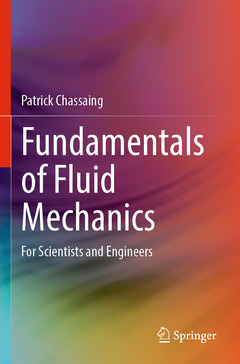Description
Fundamentals of Fluid Mechanics, 1st ed. 2022
For Scientists and Engineers
Author: Chassaing Patrick
Language: English
Subjects for Fundamentals of Fluid Mechanics:
Fundamentals of Fluid Mechanics
Publication date: 01-2024
570 p. · 15.5x23.5 cm · Paperback
Publication date: 01-2024
570 p. · 15.5x23.5 cm · Paperback
Fundamentals of Fluid Mechanics
Publication date: 01-2023
570 p. · 15.5x23.5 cm · Hardback
Publication date: 01-2023
570 p. · 15.5x23.5 cm · Hardback
Description
/li>Contents
/li>Biography
/li>Comment
/li>
This textbook provides a coherent and structured overview of fluid mechanics, a discipline concerned with many natural phenomena and at the very heart of the most diversified industrial applications and human activities. The balance between phenomenological analysis, physical conceptualization and mathematical formulation serve both as a unifying educational marker and as a methodological guide to the three parts of the work. The thermo-mechanical motion equations of a homogeneous single-phase fluid are established, from which flow models (perfect fluid, viscous) and motion classes (isovolume, barotropic, irrotational, etc.) are derived. Incompressible, potential flows and compressible flows, both in an isentropic evolution and shock, of an ideal inviscid fluid are addressed in the second part. The viscous fluid is the subject of the last one, with the creeping motion regime and the laminar, dynamic and thermal boundary layer. Historical perspectives are included whenever they enrich the understanding of modern concepts. Many examples, chosen for their pedagogical relevance, are dealt with in exercises.
The book is intended as a teaching tool for undergraduate students, wishing to acquire a first command of fluid mechanics, as well as graduates in advanced courses and engineers in other fields, concerned with completing what is sometimes a scattered body of knowledge.
The book is intended as a teaching tool for undergraduate students, wishing to acquire a first command of fluid mechanics, as well as graduates in advanced courses and engineers in other fields, concerned with completing what is sometimes a scattered body of knowledge.
Physical concepts and mathematical tools.- Flow kinematics.- The fundamental balances of a
fluid motion.- Fluid motion models.- Flow classes.- Irrotational 2D-plane motions.- Sound wave propagation and the shock phenomenon.- The incompressible Navier-Stokes model.- Very low Reynolds number rows.
Patrick Chassaing is professor Emeritus at INPT, National Polytechnic Institute of Toulouse, France. He also taught at ISAE-SUPAERO, National Higher Institute of Aeronautics and Space, France.
Includes numerous exercises, organized in a way to enable self-evaluation
Provides a general introduction to fluid mechanics
Can be used for self-study, as well as in conjunction with a course in fluid mechanics
© 2024 LAVOISIER S.A.S.




